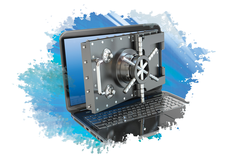Customizing the UEFI boot process
Smart Startup

The traditional BIOS dates back decades and has not been able to keep up with the rapid development of PCs and laptops. Its powerful successor UEFI takes over its tasks and provides more features, more convenience, and better security.
Since 1981, PCs have booted with the help of the Basic Input/Output System (BIOS). Over the years, different manufacturers have continued to expand the BIOS firmware system, but even after all this time, the BIOS system is difficult to adjust and still does not support 64-bit operation.
Back in the late 1992, Intel launched a new initiative to replace the venerable BIOS system with a 64-bit alternative. This Extensible Firmware Interface (EFI) initiative became the Unified EFI (UEFI) Forum in 2005. In addition to Intel, AMD, Microsoft, HP, and other prominent vendors contributed to the UEFI project.
UEFI describes the interface between a computer's firmware and operating system. Like BIOS, the UEFI implementation initializes the hardware components to prepare the launch of the operating system. However, UEFI natively supports 64-bit architectures, enables graphical user interfaces, and can protect against malicious software by only allowing signed operating systems (a feature that has come to be known as Secure Boot).
[...]
Buy this article as PDF
(incl. VAT)
Buy Linux Magazine
Subscribe to our Linux Newsletters
Find Linux and Open Source Jobs
Subscribe to our ADMIN Newsletters
Support Our Work
Linux Magazine content is made possible with support from readers like you. Please consider contributing when you’ve found an article to be beneficial.

News
-
Linux Mint 22.3 Now Available with New Tools
Linux Mint 22.3 has been released with a pair of new tools for system admins and some pretty cool new features.
-
New Linux Malware Targets Cloud-Based Linux Installations
VoidLink, a new Linux malware, should be of real concern because of its stealth and customization.
-
Say Goodbye to Middle-Mouse Paste
Both Gnome and Firefox have proposed getting rid of a long-time favorite Linux feature.
-
Manjaro 26.0 Primary Desktop Environments Default to Wayland
If you want to stick with X.Org, you'll be limited to the desktop environments you can choose.
-
Mozilla Plans to AI-ify Firefox
With a new CEO in control, Mozilla is doubling down on a strategy of trust, all the while leaning into AI.
-
Gnome Says No to AI-Generated Extensions
If you're a developer wanting to create a new Gnome extension, you'd best set aside that AI code generator, because the extension team will have none of that.
-
Parrot OS Switches to KDE Plasma Desktop
Yet another distro is making the move to the KDE Plasma desktop.
-
TUXEDO Announces Gemini 17
TUXEDO Computers has released the fourth generation of its Gemini laptop with plenty of updates.
-
Two New Distros Adopt Enlightenment
MX Moksha and AV Linux 25 join ranks with Bodhi Linux and embrace the Enlightenment desktop.
-
Solus Linux 4.8 Removes Python 2
Solus Linux 4.8 has been released with the latest Linux kernel, updated desktops, and a key removal.

